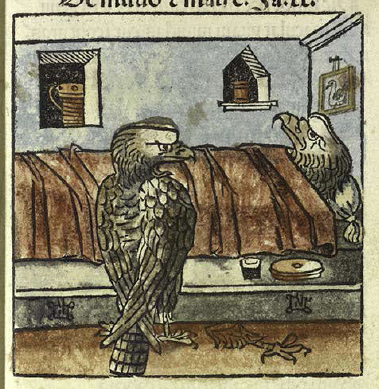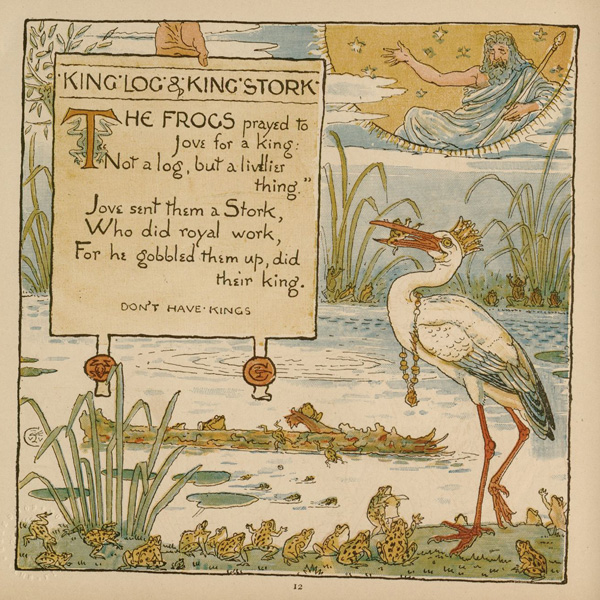11. Of the Sick Kite
The kite lay in bed; now almost dying, begs his mother to go to pray to the Gods. The mother answers, no help was to be hoped by him from the Gods, whose sacred things so often he had violated by his [own] rapines.
Moral. It becometh us to worship the Gods, for they help the pious and withstand the impious. Neglgected in felicity, they do not hear in misery. Wherefore, be mindful of them in prosperous things, that, being called, they may be present in adverse things.

12. Of the Frogs and their King.
The nation of frogs, when it was free, besought Jupiter for a king to be given to them. Jupiter laughed at the wishes of the frogs. They nevertheless pressed him again, and again, until they drove him to it. He threw down a log; that mass shakes the river with a great noise. The frogs, affrighted, are silent; they reverence their king; they come nearer step by step; at length, fear being thrown away, they leap upon and leap off him; the sluggish king is their sport and contempt. Again they provoke Jupiter; they pray for a king to be given to them who may be valiant; to whom Jupiter gives the stork. He, very nimbly stalking through the marsh, devours whatever of the frogs comes in the way. Therefore, the frogs in vain have complained of the cruelty of him. Jupiter does not hear, for they complain even this day: for in the evening, the stork going to rest, having come out of their caves, they murmur with a hoarse croaking, but they sing to one deaf. For Jupiter wills that they who petitioned against a merciful king now bear an unmerciful.
Moral. It is wont to happen to the common people, as to the frogs, who, if they have a king a little milder, condemn him of idleness and sluggishness, and wish at sometimes for a man to be given to them: on the contrary, if at any time they have got an active king, they condemn the cruelty of him, and praise the clemency of the former; either because it always repents us of the present, or because it is a true saying that new things are better than old.

13. Of the Pigeons and the Kite
The pigeons formerly carried on a war with the kite, whom that they might subdue, they chose to themselves the hawk king. He, being made king, acts the enemy, not the king: he tears and butchers no slower than the kite. It repents the pigeons of their undertaking, thinking that it had been better to endure the war of the kite than the tyranny of the hawk.
Moral. Let it repent no man of his condition too much. As Horace says, nothing is happy from every part. Truly I would not wish to change my lot, provided it be tolerable. Many, when they have sought a new state, again have wished for the old. We are almost all of so various a temper that it repenteth us ourselves of ourselves.

14. Of the Thief and the Dog
The dog answered the thief holding out bread that he would be silent, "I know thy treacheries! Thou givest bread that I may cease to bark, but I hate thy gift; for if I shall take the bread, thou wilt carry all the things out of these houses."
Moral. Take heed for the sake of a small profit, thou losest not a great one. Take heed that thou hast not faith in every man; for there are who not only say kindly, but also do kindly, with deceit.

15. Of the Wolf and the Sow
The sow brought forth; the wolf promises that he would be the keeper of the young. The sow answered that she did not want the service of the wolf; if he is willing to be accounted affectionate, if he desires to do that which is grateful, let him go farther off, for that the office of the wolf consisted not in his presence, but absence.
Moral. All things are not to be trusted to all men. Many promise their service not out of love of you, but of themselves; not seeking thine advantage, but their own.

No comments:
Post a Comment
Comments are limited to Google accounts. You can also email me at laurakgibbs@gmail.com or find me at Twitter, @OnlineCrsLady.